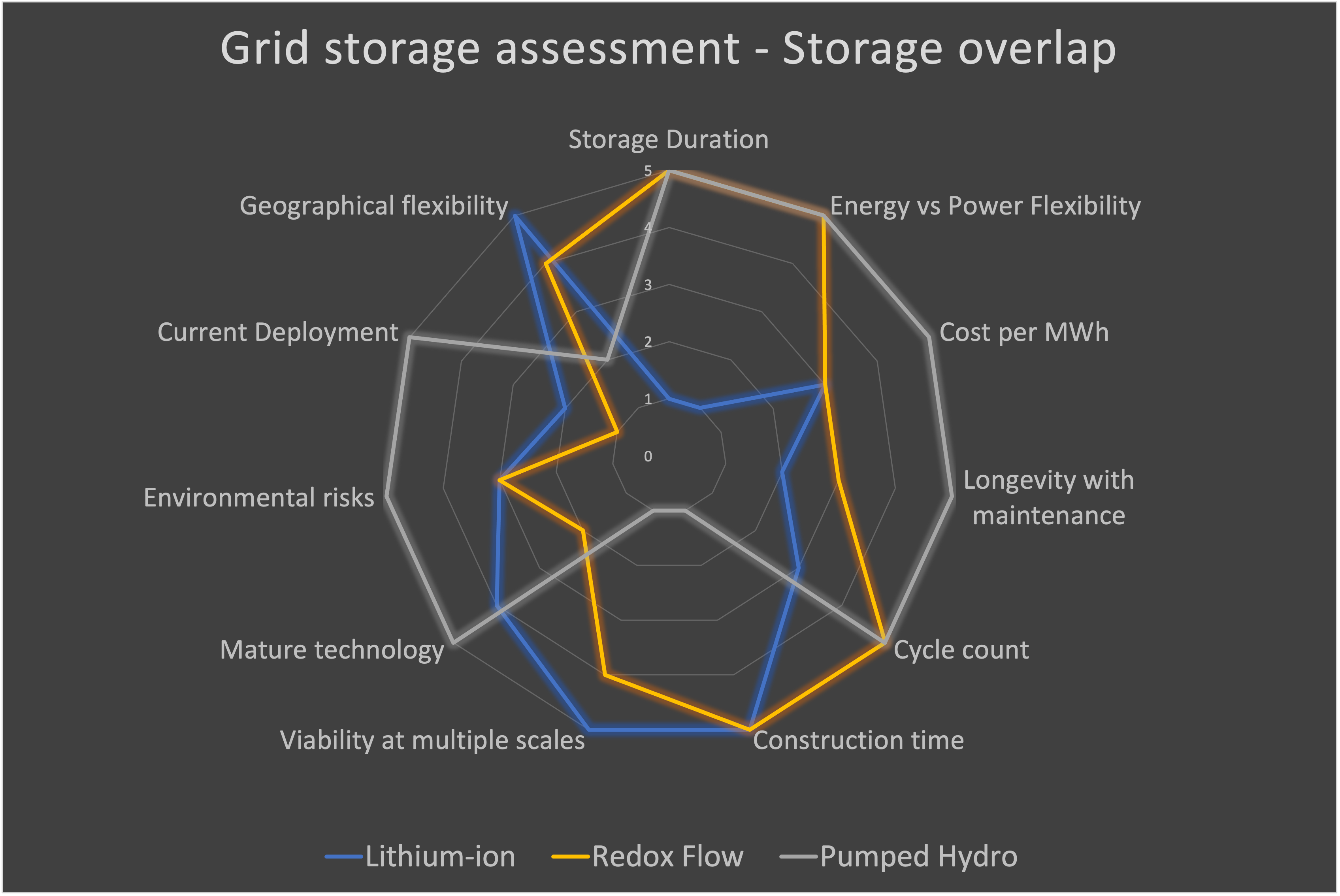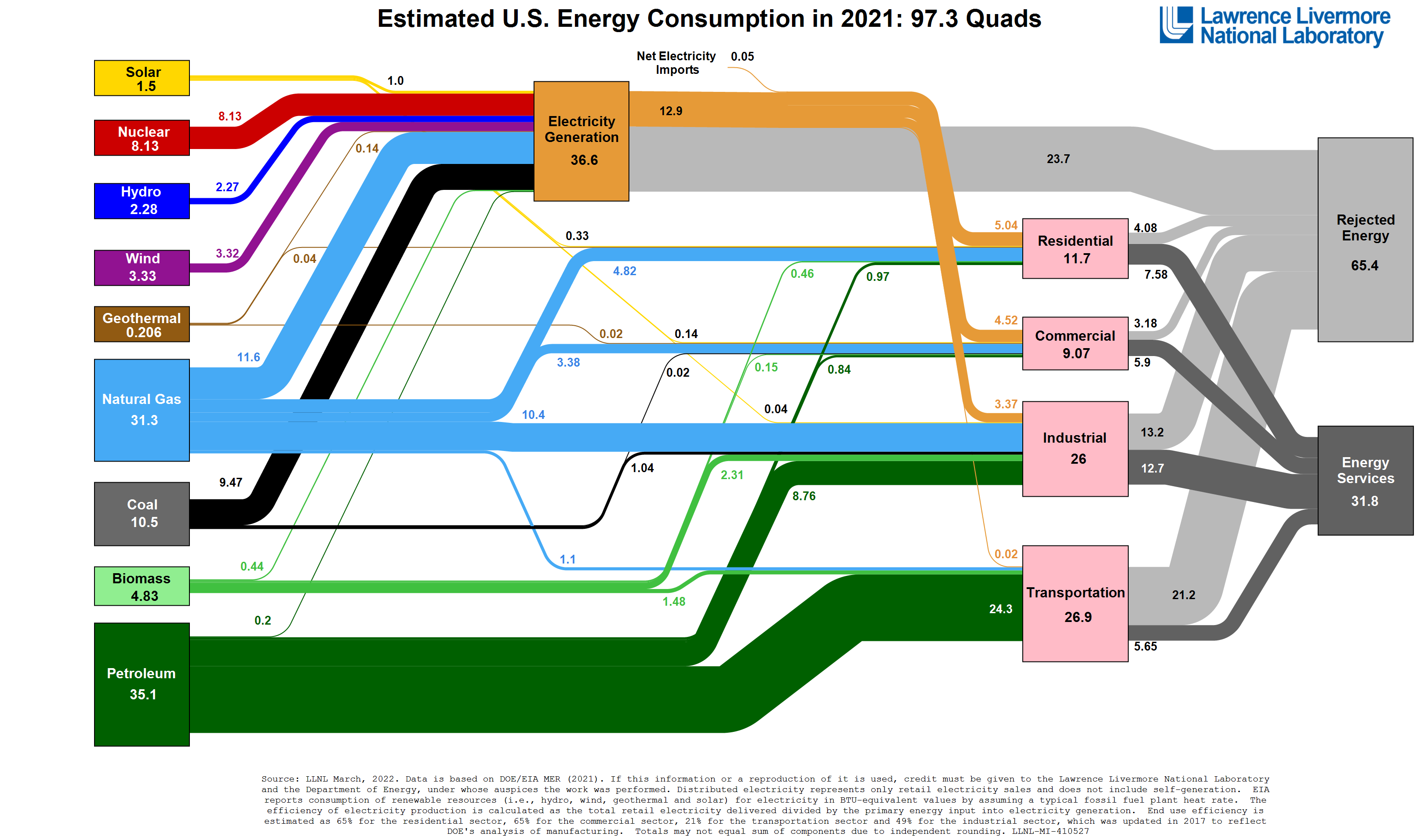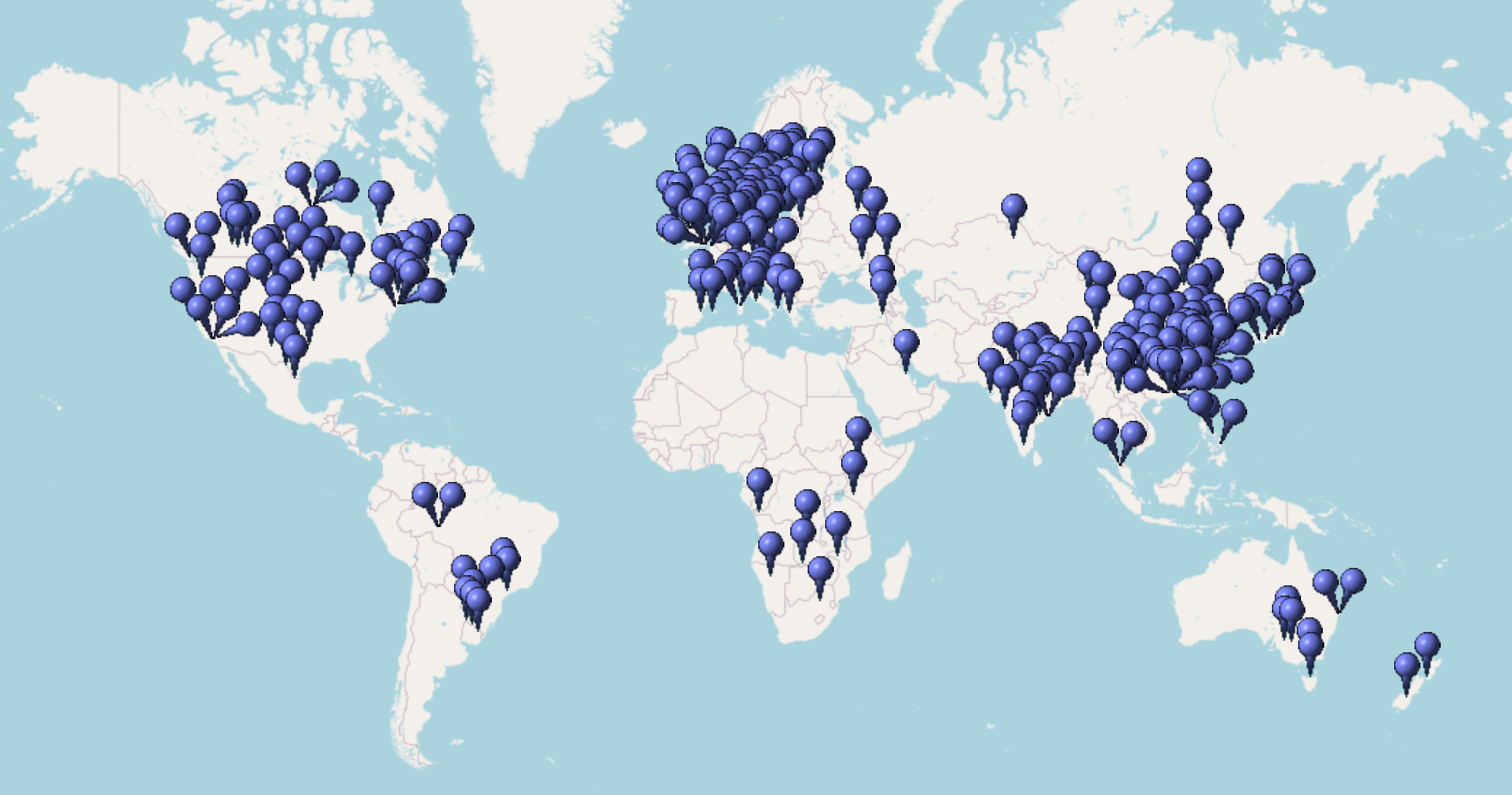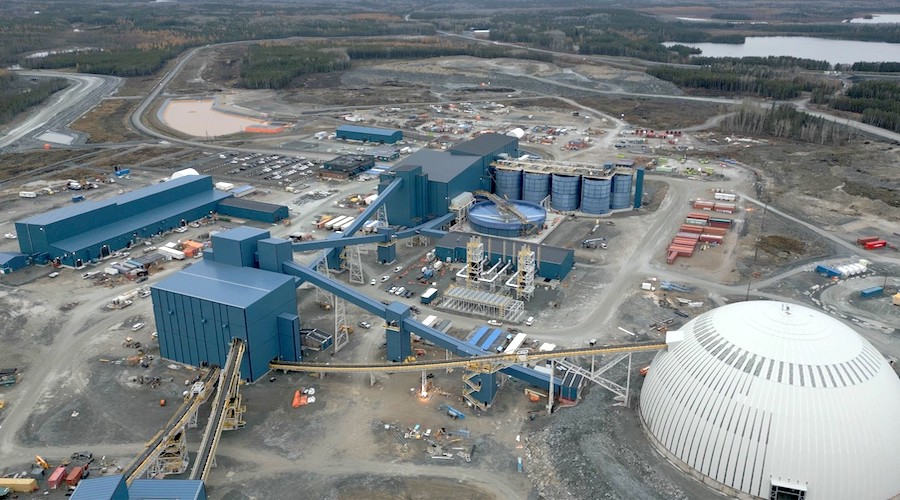
No, Minerals Shortage Is Not A Decarbonization Problem
Yesterday, as I’m writing this, Dave Borlace of Just Have a Think dropped a new video. This one was debunking the somewhat infamous Simon Michaux un-peer reviewed document which purported to prove that there weren’t enough minerals in the world to enable us to get off of fossil fuels.
Why am I writing about this video? Well, the first data point that Borlace throws on his table to start refuting Michaux’ arguments is an article of mine in CleanTechnica about energy flow diagrams. It’s always a good day when Borlace leverages my material to support his great explainers, something I think has happened three times so far. The last time, he and I spent three hours chatting about HVDC. The time before that, we didn’t know one another and he leaned on my airborne wind energy material to make his point, if memory serves (and it may not, as I can’t find that video). He dropped me a close-to-final version of this video a couple of weeks ago to get feedback (very little of note as Borlace does a really good job on research and writing).
So, Michaux. He’s a mining guy. His post-secondary education was in Australia, one of the two big mining countries in the world, the other being Canada. He has a PhD in mining-related subjects, mostly about the rock dust resulting from blowing up and grinding rock. He had some European roles and is currently an associate professor at the Geological Survey of Finland (GTK).
What’s GTK?
“Geological Survey of Finland (GTK) is an internationally oriented geoscience research agency operating under the Ministry of Economic Affairs and Employment. We are a leading European competence center on the assessment and sustainable use of geological resources. We believe that geological expertise can be used in tackling major global challenges, such as questions related to sustainable production, circular economy, clean water, low-carbon energy and climate change. For our customers and partners we provide geological expertise to create solutions for more sustainable growth. We offer diverse expert and research services, digital services and a broad range of laboratory services as well as mineral processing services. We employ over 400 professionals. For Earth and For Us!”
So, GTK is trying to do the right thing. Their heart is in the right place. Maybe Michaux’ is too. Hard to say. But, having your heart maybe on the right side of your chest doesn’t mean much if your brain is in the wrong place.
Via GTK, Michaux published a paper in 2021. Let’s be clear. This was published under the auspices of the GTK. They amplified it. They leant it their authority. But it wasn’t peer reviewed. This was more of a napkin math paper by Michaux than anything else.
I’m going to be clear in a different way. I do napkin math all the time. My work is rarely peer reviewed. I’m in a few peer-reviewed journals and texts, but mostly because occasionally my work rises to that level and someone asks me to let them include it. I’m not an academic. I don’t publish or perish in that model. I live with post-publication expert review, which is occasionally humiliating, but I work hard to learn from that and fix my errors. I’m not criticizing Michaux from the perspective of someone who is a rigorous academic.
But Michaux is an academic. He is associated with an academic institution. He did lean on GTK’s credentials in publishing an un-peer reviewed paper. So is Michaux an awesome academic? Errr, not really. H-index is one of the basic academic metrics. It’s a measure of how much an academic’s work is cited by others. Over 40 is good. Michaux has an h-index of 8. This isn’t to say that he’s a slouch, but it’s not a good sign. He’s not a spring chicken academic at the beginning of his career. He’s in his 50s. I’m privileged to know a few academic rock stars. He’s not an academic rock star.
Is Michaux an energy expert? Umm, no. He’s a mining expert. Want to know what happens in a mine when the explosives go boom? He’s a good guy for that apparently, at least from an academic perspective. From his background, I don’t imagine anyone has him placing explosives. More an analysis and suggestions guy. And, once again, it’s not like anyone asks me to place explosives.
But he’s not an electricity and energy guy. He’s not a batteries guy. He’s not an EV guy. He’s not a decarbonization guy. He’s not a systems thinking guy. He’s not a grid guy. He’s not a fuels guy. He’s not a transportation guy. He’s not a minerals recycling guy. He’s a mining and minerals expert, within a subset of that field. And once again, not an academic rock star.
So why are we talking about this not-so-hot academic whose expertise is in the fine rock particles that result from blowing up and grinding rock during mining?
Because he wrote a paper with the implicit or maybe explicit GTK stamp of approval which states that there weren’t nearly enough minerals on earth to support decarbonizing through electrification. Yeah, we can’t build enough batteries or transmission or storage to leave fossil fuels behind. According to Michaux. Who doesn’t have anything remotely like the background to make this claim.
Completely understandably, a lot of the usual suspects thought Michaux’ paper was just what they needed. Did they need it to accelerate decarbonization? Ummm, no. Did they need it to point to actually better alternatives? Ummm, no. Did they need it to ward off economically and societally positive movement. Ummm, no.
Did they need it to prevent positive movement on climate action? Yes. Did they need it to promote bad alternatives like hydrogen? Yes. Did they need it to promote minutely more efficient internal combustion engines? Yes.
Okay, so that’s Michaux, mediocre academic and accidental superstar in the climate inaction lithosphere. Clearly I’ve covered the ad hominem side of this. A different way of saying it is that I’ve made it clear that people relying on his paper are suffering under the auspices of the appeal to false authority fallacy. He’s not an authority. He’s a guy who may be trying to figure out decarbonization, but he’s not remotely an authority on the subjects he’s published a non-peer reviewed piece on. The confirmation bias among those who love his paper is thick on the ground.
But what about the merits of his paper? Well, there aren’t any to speak of.
Michaux first commits the primary energy fallacy, multiplying the future requirement for energy by a large percentage. As I noted recently, with heat pumps, electrified ground transportation and some more efficient industrial electric heat, the USA’s primary energy demand drops by 50%, even accounting for continued inefficiencies. Fossil fuels are deeply wasteful forms of energy.
See that big gray box of rejected energy on the upper left? That’s energy thats wasted due to inefficiencies, and those inefficiencies are almost entirely due to burning fossil fuels which results in a lot of high entropy waste heat of no value to us. The energy services box on the lower right, a third of the primary energy, is what we actually need to replace. But we don’t even need to replace all of that. Heat pumps use one unit of electricity to move three units of heat around, on average. That’s all residential and commercial heat, and 45% of industrial heat. A very large percentage of that heat comes from burning fossil fuels today, and with heat pumps, two thirds of that goes away.
Michaux just assumes that we need to replace all the primary energy on the left hand side with exactly the same amount of energy. That’s the primary energy fallacy. Electrifying everything, the purported point of his analysis, means a lot less primary energy even if we continued to use fossil fuels. But we won’t. We’ll use wind, solar and water, which don’t waste any resources to generate electricity. See the electricity generation box in the middle top of this diagram? See the big gray bar of rejected energy coming out of it? Well, all that waste goes away too. But not in Michaux’ world.
Next Michaux overstates the requirement for batteries by at least an order of magnitude by ignoring a few things. First, he ignores the massive HVDC interconnects being built around the world that deflate grid storage requirements. HVDC is the new pipeline (and LNG tanker and oil tanker) after all.
This is an incomplete map of HVDC locations I pulled from Open Street Maps. It’s not unreasonable, but I get monthly HVDC newsletters — yes, I know I’m a complete and utter energy nerd — from RTE International. Their data set, included every month, has about 300 installed or committed HVDC electron pipelines globally, and like most things of its kind, is probably missing a bunch in China as China doesn’t bother to tell everybody everything all the time in excruciating detail, unlike a certain country in North America. (As a note, it’s very useful that the USA is so committed to TMI, as it gives people like me data like the LLNL charts to base analyses on, and then make informed guesses about how it applies in other countries that aren’t over-sharers.)
Broadening the grid with HVDC fundamentally drops grid storage requirements by allowing electrons to flow from where they are generated to where they are needed, and from low demand areas to high demand areas. But not in Michaux’ world.
Michaux then assumes that the only form of energy storage is lithium ion batteries brimming with cobalt and nickel. He bases his assessment of mineral requirements on a single form of energy storage, one where there are some reasonable concerns. This means he ignores the dominant form of grid storage in operation and under construction globally today, pumped hydro, instead assuming as incorrectly as the rest of his efforts, that cell-based lithium ion batteries would be every form of storage.

Radar diagram of major decision factors which support a mix of pumped hydro, redox flow and lithium-ion grid storage by author.
I don’t even rate cell-based batteries as the dominant form of grid storage, never mind the only one. In my grid storage projection through 2060, one which does account for transmission interconnects, renewables and electrifying everything, pumped hydro remains the dominant form of storage for power and energy on grids, just as it has been since 1907. Redox flow batteries, which share pumped hydro’s very useful decoupling of power and energy, come in second. Cell-based battery chemistries, with their tight coupling of power and energy, are third, followed by about 100 GW of also rans including hydrogen, compressed air and the like.
We will need a lot of cell-based batteries. We’ll need them in light vehicles, trucks, buses, a lot of ships, a bunch of airplanes and some for trains to get them past areas too expensive to put overhead lines in like tunnels. All ground transportation is going to electrify, and except for trains and some routes for long haul trucks, that’s going to be batteries. All inland shipping and two-thirds of short sea shipping will electrify. All aviation is likely to electrify eventually, but even in my 2100 projection of the space, there’s still some SAF biofuel being burned.
Why do I have the ability to assert these things? Because I’ve done the work to understand energy requirements for all of those domains, worked through the requirements and worked through the solutions. Has Michaux? No, he’s apparently unaware of the questions he should be asking, never mind good answers to the questions.
There will be lots of different cell-based battery chemistries for different use cases. But not in Michaux’ world. Lithium-ion is it. He ignores battery chemistry innovation that has radically dropped or eliminated cobalt entirely. He ignores lithium phosphate batteries. He ignores the emerging sodium-ion batteries. Redox flow batteries? What are those? No, there can be only one in his world it seems, and he bases all his projections on stale ratios of key metals.
Is this the end of challenges with Michaux’ paper? No, no it isn’t. Next up is copper. Michaux doesn’t realize that aluminum is a commonly used conductor and almost entirely used in transmission, so vastly misstates copper requirements on top of his other massive errors. Aluminum is a lot lighter than copper, and when speccing out solutions, industrial engineers make choices about what to use. Further, as we continue to electrify everything, a lot of current heavy users of copper, mechanical solutions, become light users of copper, electronic solutions. In electric cars, enormous amounts of innovation is going into reducing copper use, simply because copper is heavy and lots of complex wiring is a pain to manufacture and a expensive to fix if something goes wrong. EV OEMs are fairly regularly taking 30% of copper out of new versions of EVs.
Yes, we’ll need more copper. But not the absurd amounts Michaux projects. There’s more than enough.
What else? Well, Michaux lives and works in hard rock mining. That’s a big and important sector, but he has no sense of the magnitude of other materials we mine. Even the masses of minerals he grossly inflates are a lot less than a single year’s extraction of coal, oil and gas, and an even smaller percentage of the mass of CO2 from burning them.
Anything else? Anyone? Bueller? Anyone?
Why, yes there is. All of the minerals he’s so concerned about are recyclable. Oil, gas and coal aren’t. Battery packs for EVs will be turned into battery backs for new EVs, although they might go through an intermediate life as grid or behind the meter storage. Copper will be stripped from EVs, not to mention all of the fossil fuel infrastructure which uses so much of it, and be put into new EVs. Aluminum will be melted down and turned into more HVDC transmission or aircraft bodies. We’re moving toward a maximal recycling world. It’s a lot easier to recycle the metals in an EV or grid storage solution than it is to recycle the batteries in an Apple Watch, after all, and a rather absurd recycling industry already exists and is growing rapidly. But not in Michaux’ world. All EVs forever will need newly mined minerals it seems.
The paper came out two years ago. I didn’t bother to write about it until triggered by Borlace’s video. Others had done a great job at debunking, so I didn’t need to. But with Borlace quoting me, I figured I’d put my oar in the water too.
Have others told you there are not enough raw materials to transition to 100% renewables?
Did they say minerals are the new oil?
Maybe they believed @SimonMichaux of @GTK_FI?
If so, please explain to them they were fooled, by showing them this thread. pic.twitter.com/q4K4hi0Ed2
— AukeHoekstra (@AukeHoekstra) November 19, 2022
Auke Hoekstra, Program Director NEON research at Eindhoven University of Technology, and an actual expert on decarbonization and electrification, did a good debunk on Twitter and points to an even more detailed debunk by another actually credible analyst in the thread. Worth skimming through, if Twitter is your preferred form of ingesting data. For an actually useful paper on minerals requirements, I’d recommend this peer-reviewed one (one of many) which reach the opposite conclusions from Michaux. Or go read the International Energy Agency’s report.
Michaux makes so many compounding mistakes that it’s remarkable anyone takes him remotely seriously. But, of course, he is telling a story a lot of people want to hear, and so is being amplified by the usual suspects. He is undoubtedly taking their praise as indication that he’s right, as opposed to simply useful temporarily and soon to be discarded. Confirmation bias doesn’t overcome reality. He’s a regular on podcasts. He gets cited in comment threads and on Twitter and in LinkedIn by people who sometimes even get his name right. Someone defending his analysis on a LinkedIn thread yesterday said he was submitting his paper for peer review, which is always a bit of a crap shoot. It’s possible he’ll get it accepted. It won’t be in Nature Energy, that’s for sure.
A bunch of different groups have adopted him as their go-to guy for their particularly perverse view of the world. The degrowth types, a variant of the pastoralist utopians, who seemingly want everyone to live in ecovillages with 50 km diets, think he’s the bee’s knees, because there is no solution at all without radical elimination of people and the economy, and a complete transformation of every business and political process. The hydrogen types think it proves that hydrogen is the answer for all energy. The fossil fuel types amplify it to slow the inevitable decline of their revenues and profits. The internal combustion types amplify it because their entire business model is facing a cliff. These are all motivated thinkers.
I make no statements about what motivated Michaux, but the number of unforced errors in his material makes it clear he wasn’t approaching this in anything remotely like an actually data-centric, solution-centric and empirical manner. And I’ve seen no indications that despite all the quite clear debunkings of his material that he’s even acknowledged, let alone addressed any of his multitude of errors.
Watch Borlace’s video. Just have a think. When messaging like Michaux’ crosses your screen, ask who benefits and who is amplifying it.
I don’t like paywalls. You don’t like paywalls. Who likes paywalls? Here at CleanTechnica, we implemented a limited paywall for a while, but it always felt wrong — and it was always tough to decide what we should put behind there. In theory, your most exclusive and best content goes behind a paywall. But then fewer people read it! We just don’t like paywalls, and so we’ve decided to ditch ours. Unfortunately, the media business is still a tough, cut-throat business with tiny margins. It’s a never-ending Olympic challenge to stay above water or even perhaps — gasp — grow. So …






